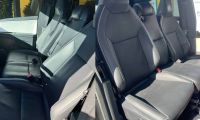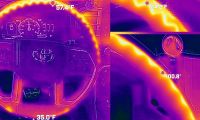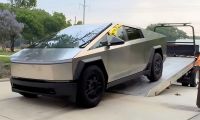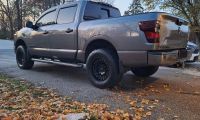In the past 24 hours, a variety of websites including Road & Track have detailed the remarkable 727 horsepower 2016 Ford Mustang GT coupes that are being built and sold by Lebanon Ford in Ohio. Lebanon Ford is building Roush supercharged versions of the base model Mustang GT coupe with 727 horsepower and they are selling these monsters for just $40,000.
No catch, no strings attached. You can call Lebanon Ford, order a 2016 Mustang GT coupe with the stage 2 Roush supercharger and when it is ready, you can drive out with a 727 horsepower Mustang for under $40,000 (not including tax and title). It is an incredible deal and of course, it is being compared to the 707 horsepower Dodge Challenger SRT Hellcat, but before people start proclaiming the Lebanon supercharged Mustang GT as the better buy than the Hellcat Challenger – there are several key points that need to be considered.
The $40k Lebanon 727hp Mustang GT
We know that the 2016 Ford Mustang GT from Lebanon Ford packs 727 horsepower thanks to the Roush stage 2 supercharger for just $39,995 (plus applicable fees), but before comparing this monster Mustang to the Hellcat Challenger, let’s take a quick look at what else you get for that price.
The supercharged 5.0L V8 produces 727 horsepower and 610lb-ft of torque, with that power being channeled to the rear wheels via the Mustang’s standard 6-speed manual transmission and a 3.31 rear gear set. The behind the standard P235/50R18 3-season tires and 18 inch aluminum wheels are 14 inch front brakes and 13 inch rear brakes, and the suspension is the same found on the 435hp Mustang GT, with the new independent rear setup.
On the inside, the $40k Mustang GT with 727hp has cloth seats, manual climate control adjustments and a 6-speaker sound system mated to an AM/FM/CD player.
It is a fairly minimal package, but there is still no question that a 727hp Mustang GT for $40,000 is a smokin’ deal. However, as great of a deal as the Lebanon supercharged Mustang might be, comparing this Mustang to the Hellcat Challenger is a stretch if you’re looking at anything aside from dyno numbers.
Hellcat VS Lebanon Mustang GT
Here is a quick rundown of the vital statastics of the Dodge Challenger SRT Hellcat and the Lebanon supercharged Ford Mustang GT. The Mustang costs $39,995 while the Challenger has an MSRP of $65,190.
The Mustang has a supercharged 5.0L V8 with 727 horsepower and 610lb-ft of torque. The Challenger has a supercharged 6.2L Hemi V8 with 707 horsepower and 650lb-ft of torque. Of course, we know that the Challenger’s power figure is underrated and realistically, the Hellcat Hemi makes closer to 725hp, but based on marketing materials, the Mustang has an advantage of 20 horsepower and a disadvantage of 40lb-ft of torque.
The standard Mustang GT coupe weighs 3,704lbs and I wouldn’t expect that the Roush supercharger package adds more than 200lbs, but that is the number that I will use for the comparison – leading to a total curb weight around 3,900lbs. The Challenger, on the other hand, has an official curb weight of 4,439lbs, so the Mustang should have a weight advantage of at least 500lbs in the base form.
The Mustang has 14 inch front brakes which were designed to balance longevity and performance on a 435hp car while the Challenger has 15.4 inch Brembo high performance front brakes designed to optimize stopping forces. Even though the Challenger is bigger and heavier, braking is the first area in which the Hellcat Challenger will have a massive advantage over the Lebanon Mustang GT.
The Mustang GT has the standard fixed suspension system, which is designed to balance ride quality and handling capabilities, while the rear suspension has been designed to handle the forces of a 435hp engine. The Hellcat Challenger has an adaptive suspension system which allows the driver to adjust the damper stiffness with the push of a button. This suspension setup was designed specifically for the Challenger with 700+ horsepower – which is why the brawny muscle car is able to lay down low 11-second quarter mile times, as the rear suspension does a great job of putting the power to the road and keeping it there. Also, while the Mustang has 18 inch wheels with 235 width all season tires, the Hellcat Challenger has lightweight 20 inch wheels wrapped in 275 width all season performance tires.
Even though the Challenger is considerably heavier, the high performance suspension system and the better wheels/tires on the Hellcat will give the Dodge an advantage when launching down on the drag strip and when attaching the twisties.
Lastly, and maybe most importantly, is the transmission lineup for each of these cars. The Mustang GT comes with a standard 6-speed manual gearbox which was designed for use behind the 435hp 5.0L V8. I am confident that this transmission can handle the output of the supercharged package, but the Hellcat Challenger’s 6-speed manual transmission was originally designed for use in the Dodge Viper, so you have two very different manual transmissions in these two cars. Also, the quickest Hellcat Challengers have the 8-speed automatic transmission, while the Lebanon Mustang GT is only available with the optional 6-speed automatic, which doesn’t offer the same level of performance as the Dodge 8-speed.
Also, while this won’t matter to many people who are focused specifically on performance, the Hellcat Challenger comes with heated and cooler leather seats and a premium infotainment package for that price, so the Dodge has a far more impressive interior.
Most importantly, what you do not get with the 727hp Mustang GT from Lebanon Ford is a warranty. While you do get a warranty from Roush on the supercharger, this add-on package voids the factory drivetrain warranty. On the other hand, the Hellcat Challenger has a full drivetrain warranty which covers every component of the 707hp muscle car for the first 5 years or 60,000 miles.
Summary
The Lebanon Mustang GT has 727 horsepower and 610lb-ft of torque, but with the standard tires and suspension setup of the Mustang GT, I have a very hard time believing that this car could really use all of that power as efficiently as the Hellcat Challenger. Although the Dodge is much heavier, part of the excellence of the Hellcat package is the long list of high performance components which compliment that supercharged engine and that is why it is the quickest factory-built American muscle car ever.
The Lebanon Mustang GT package is an incredible deal for someone who wants to be able to say that they have 727 horsepower or someone who likes to flex their muscles on the dyno. To really allow this supercharged Mustang to measure up to the Hellcat Challenger, the buyer would need to add a variety of aftermarket features and while some of those items are available when optioning the Mustang GT – that quickly increases the pricing of the Ford muscle car. Stepping up to the GT Premium and adding some of those items which close the gap to the Hellcat quickly raises prices by just over $10k, and that still doesn’t give the Mustang GT the same high performance brakes and suspension of the Dodge.
In the end, the Lebanon Ford Mustang GT with 727hp and a price tag of $39,995 is an amazing deal, but anywhere outside of the dyno shop or the internet message boards, this car is a far cry from a proper competitor for the Hellcat Challenger.













Comments
It doesn't take much to know
Permalink
It doesn't take much to know that the entire SC package adds about 110 lbs. and 10 lbs ea, lighter, 10"-11" while rear wheels drops 40 lbs, and a light driveshaft acts as if 65-80 lbs more was lost. Then there's the standard new GT's brakes. They are infact the old 2013-14' models track pack 14" Brembos without the name on them. Doing a simple $1300 performance suspension upgrade will take it well past a Performance pack model in handling. So, for under 45k, you'd have a Hellcat killer. Actually, Ford Racing has tested a performance pack car with a header upgrade, special calibrated tune and the SC at 635 hp/575 tq and ran 10.8@130 on slicks and 11.2@128 on sticky michelinpikot Supersport tires. The Hellcats best runs, on a very prepped track on sucks were in the 11.7-11.8 at 123 mph range. A 650 hp new GT could run circles around the Hellcat. Oh, and a 8 spd auto hellcat Challenger is 4595 lbs, not 4435... Plus the mustang is far more aerodynamic, so as speed rises, the favor goes to the GT.
The Roush supercharger kit
Permalink
In reply to It doesn't take much to know by John (not verified)
The Roush supercharger kit does not void the factory ford warranty when its installed by a Ford deal. The Lebanon mustang comes with a full factory warranty.
where in the hell did you get
Permalink
In reply to It doesn't take much to know by John (not verified)
where in the hell did you get those stats from for the hellcat, most are running high tens, low 11s BONE STOCK.
I have a 2014 Rausch stage
Permalink
I have a 2014 Rausch stage three convertible. It is supposed to have 608 hp .
I would be interested in trading up the additional horsepower, but I have a hard enough time getting my tires to hook up . I am very curious how the stock tires are handling all that torque and horsepower?
Nonsense. The price
Permalink
Nonsense. The price differential alone would result in a Mustang that would blow the Hellcat to Mars.
I own this current set up.
Permalink
I own this current set up. And with slicks at Woodburn drag strip I whooped a hellcat by 3 car lengths... nuff said